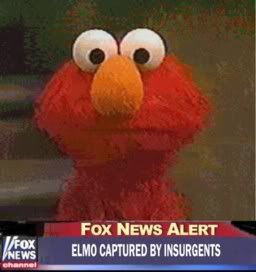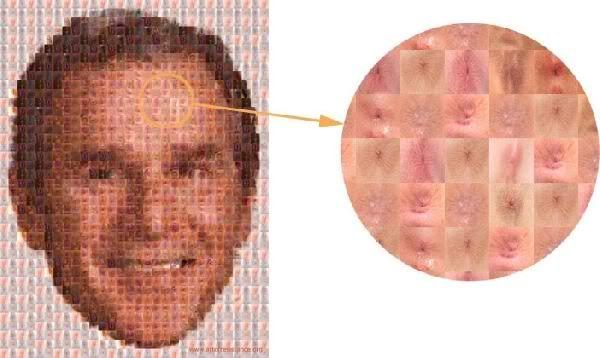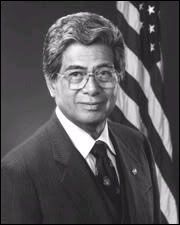While Sam was visiting, I watched a whole bunch of children's programs on DVD.
A big favorite was
Thomas the Tank Engine. The theme song gets stuck in your head for days on end, and the only thing I can say in its defense is "At least the theme isn't as bad as the theme from
Barney the Dinosaur" (which we did NOT watch). There's an additional clip on the end of the "Hooray for Thomas" dvd, a montage of the Isle of Sodor with children singing a truly cloying and awful song called "The Red Balloon".
James see the red ballooooon
Twisting and spinning and diving and soaring...(I always replace the second line with "Farting and fucking and shitting and puking" or something similar. It keeps me sane. "Drinking and fighting and drugging and tripping...")

We watched a little bit of
Bob the Builder, which Melissa hates but I kind of enjoy. That's probably because I'm a guy, and like all guys I used to be a boy, with the inherent fascination with heavy machinery.

We also watched
Elmo's World: Happy Holidays! (
EW:HH for short), which wasn't as bad as I expected it would be, but left me with some niggling questions.

I must admit that I have long loathed Elmo. When I was a boy
[he said, sounding like the crotchety old bastard he's turned into], we had none of this "Elmo" shit. Just the sound of that muppet's squeaky voice is enough to send me to the top of a very tall building without a net. However, I have to admit that after watching the dvd, Elmo really isn't that obnoxious. Once you get past the squeaking, there's a lot for adults to laugh at with Elmo: just like the rest of the
Sesame Street characters, Elmo's lines have plenty of subtle adult humor. Certainly more than the retarded purple dinosaur.
No, what was weird about
EW:HH! was the
complete absence of God, and by God I mean
Jehovah, Yahweh, or whatever you want to call Him. It. Whatever.
I think anyone who reads this blog knows that I have little patience for religion. About the closest I come to any belief in God is the Deist concept as articulated so powerfully by Thomas Paine in
Age of Reason (this one's a biggie):
THE WORD OF GOD IS THE CREATION WE BEHOLD: And it is in this word, which no human invention can counterfeit or alter, that God speaketh universally to man.
Human language is local and changeable, and is therefore incapable of being used as the means of unchangeable and universal information. The idea that God sent Jesus Christ to publish, as they say, the glad tidings to all nations, from one end of the earth unto the other, is consistent only with the ignorance of those who know nothing of the extent of the world, and who believed, as those world-saviours believed, and continued to believe for several centuries, (and that in contradiction to the discoveries of philosophers and the experience of navigators,) that the earth was flat like a trencher; and that a man might walk to the end of it.
But how was Jesus Christ to make anything known to all nations? He could speak but one language, which was Hebrew; and there are in the world several hundred languages. Scarcely any two nations speak the same language, or understand each other; and as to translations, every man who knows anything of languages, knows that it is impossible to translate from one language into another, not only without losing a great part of the original, but frequently of mistaking the sense; and besides all this, the art of printing was wholly unknown at the time Christ lived.
It is always necessary that the means that are to accomplish any end be equal to the accomplishment of that end, or the end cannot be accomplished. It is in this that the difference between finite and infinite power and wisdom discovers itself. Man frequently fails in accomplishing his end, from a natural inability of the power to the purpose; and frequently from the want of wisdom to apply power properly. But it is impossible for infinite power and wisdom to fail as man faileth. The means it useth are always equal to the end: but human language, more especially as there is not an universal language, is incapable of being used as an universal means of unchangeable and uniform information; and therefore it is not the means that God useth in manifesting himself universally to man.
It is only in the CREATION that all our ideas and conceptions of a word of God can unite. The Creation speaketh an universal language, independently of human speech or human language, multiplied and various as they be. It is an ever existing original, which every man can read. It cannot be forged; it cannot be counterfeited; it cannot be lost; it cannot be altered; it cannot be suppressed. It does not depend upon the will of man whether it shall be published or not; it publishes itself from one end of the earth to the other. It preaches to all nations and to all worlds; and this word of God reveals to man all that is necessary for man to know of God.
Do we want to contemplate his power? We see it in the immensity of the creation. Do we want to contemplate his wisdom? We see it in the unchangeable order by which the incomprehensible Whole is governed. Do we want to contemplate his munificence? We see it in the abundance with which he fills the earth. Do we want to contemplate his mercy? We see it in his not withholding that abundance even from the unthankful. In fine, do we want to know what God is? Search not the book called the scripture, which any human hand might make, but the scripture called the Creation.
Furthermore, I believe the Christian sense of justice is a joke:
For the internal evidence is, that the theory or doctrine of redemption has for its basis an idea of pecuniary justice, and not that of moral justice.
If I owe a person money, and cannot pay him, and he threatens to put me in prison, another person can take the debt upon himself, and pay it for me. But if I have committed a crime, every circumstance of the case is changed. Moral justice cannot take the innocent for the guilty even if the innocent would offer itself. To suppose justice to do this, is to destroy the principle of its existence, which is the thingitself. It is then no longer justice. It is indiscriminate revenge.
This single reflection will show that the doctrine of redemption is founded on a mere pecuniary idea corresponding to that of a debt which another person might pay; and as this pecuniary idea corresponds again with the system of second redemptions, obtained through the means of money given to the church for pardons, the probability is that the same persons fabricated both the one and the other of those theories; and that, in truth, there is no such thing as redemption; that it is fabulous; and that man stands in the same relative condition with his Maker he ever did stand, since man existed; and that it is his greatest consolation to think so.
All that said, I do not begrudge the Christians, Jews, Muslims, or any other faith their peculiar and specific beliefs (although many of them would probably like to deny me mine). The fact is if you're talking about the history or meaning behind a religious holiday, you simpy have to address the concept of God. I didn't like Bile O'Reilly's pretend "War on Christmas" either, but the it is nonetheless true that calling it "Holiday this" or "Holiday that" is really a marketing term designed to bring in as many consumers as possible. Muslims don't Christmas shop, but they MAY come out for a "Holiday sale". (Jews are far more likely, in my experience, to celebrate "fake Christmas" as Mariel Woloff puts it.)
EW:HH is called precisely that because the video's purpose is to explain the reason behind Christmas, Hannukah, and Kwanzaa. Knowing very little about Kwanzaa, I will stick to the the two former.
Christmas is explained through a school-play type sketch put on by the muppets, including Herry Monster, Grover, and Cookie Monster as the three Wise Men (Cookie Monster brings cookies instead of myrrh, because he ate all the myrrh. Then he eats the cookies too, very funny stuff). Prairie Dawn does the narration and plays the incidental music on the piano. After all the stuff about the Christmas star that guided the magi, the birth in the manger, no room at the inn, Prairie Dawn explains that reason we celebrate Jesus' birth is that he was a "great teacher."
That's it. Nothing about the so-called "virgin birth" (and if Joseph believed that one, I've got a bridge in Brooklyn to sell him), nothing about the angel visiting the shepherds. I can understand glossing over Herod's slaughter of the babies, heck, even that scary-as-fuck crucifixion shit, but without the particular role of the supernatural in the conception and birth of Mr. Christ, it leaves the viewer wondering "well, why don't we have
Gandhimas, or
Confucius Carols?" For that matter, why don't we have "Miss Couttsmas"? She was the best second-grade teacher ever! Thus, the main character, Jesus' Dad, is absent from the explanation of Christmas.
[Kind of like me in the story of Sam. but then I'd be sounding really bitter. Except I AM really bit... oh never mind.]So on to Hannukah, which was also pretty entertaining. Elmo wants to learn about the holiday so he turns his tv to the Hannukah Channel, where animated newscaster Veronica Monica tells the story of Hannukah. It starts off well enough: the Romans seize the temple and won't allow the Jews "to live and worship as they please." Along comes Judah Macabee, who looks and sounds an awful lot like
Roger Ramjet. "I'm Judah Macabee, and I live and worship as I please!". He gets the rest of the Macabees together and they kick the Romans out of the Temple. "And stay out, ya meanies!" Judah yells as they sulk away. Judah wants to light the lamp to celebrate their victory, but as we all know the lamp only has enough oil for one day. The servant goes off for more oil, and amazingly, the lamp burns for eight whole days.
"That's some great lamp!" exults Judah.
"It wasn't me," says the lamp.
"Then that must mean it was... A MIRACLE!" announces Judah Macabee. And that's that. No mention of where the miracle came from, who caused the miracle, or any further information. The prime mover in the story, Yahweh, is again simply absent.
I will reiterate that I am not a religious man, and that I do not profess these faiths. I think the premises they're based on are flawed at best, and in general ludicrous (a particularly spectacular take down of God's "mercy" can be seen in Age of Reason, part 1, chapter 7; and part two, chapter 1 in the deconstruction of Moses' character).
However, if you're promising to tell people the reason behind religious holidays, you simply have to include God. You cannot tell the story of the Civil War without slavery or Abraham Lincoln. You cannot tell the story of the Revolution with the Minutemen or George Washington or mad King George. You don't have to AGREE with or endorse all their actions (lord knows our "friends" below the Mason Dixon line continue to refer to the Civil War as "the war of northern aggression" and think nothing of hoisting their traitorous flag above their statehouses), but they are the main characters in the story and need to be included.
I do not know why God is omitted from
EW:HH. I can understand the reluctance of a publicly funded organization like PBS to endorse one religion over the other, but that wasn't the purpose of this dvd. How difficult would it have been for the writers to have come up with a line for one of the characters such as "People who celebrate Christmas are called
Christians, a belief that has many varieties. They believe in the same God as Jewish people, but also believe that Jesus was God himself turned into a man, and that he came to our world to teach us how to be good." A similar explanation for the miracle of the lamp would have been welcome as well. It's not a miracle without God or some other supernatural cause: otherwise it's just a cheap magic trick or a coincidence.
Personally, I'm glad I don't believe in God. If I did, I'd be wondering what the fuck I did to deserve all the shit He's rained down on me for the past two fucking years. But for some little kid, this dvd doesn't answer any questions or open the door for more discussion.
Perhaps that's for the best: can you
imagine what kind of stuff I'd be telling Sam about the [non]existence of God?
"Well, son, it's kind of like Santy Claus but for grownups. The difference is, if you're bad, instead of getting coal in the sticking, you get thrown into a forever-burning, but never-destroying, lake of fire. So while you DO have free will, you'd better love God really good or He'll hurt you forever."









































